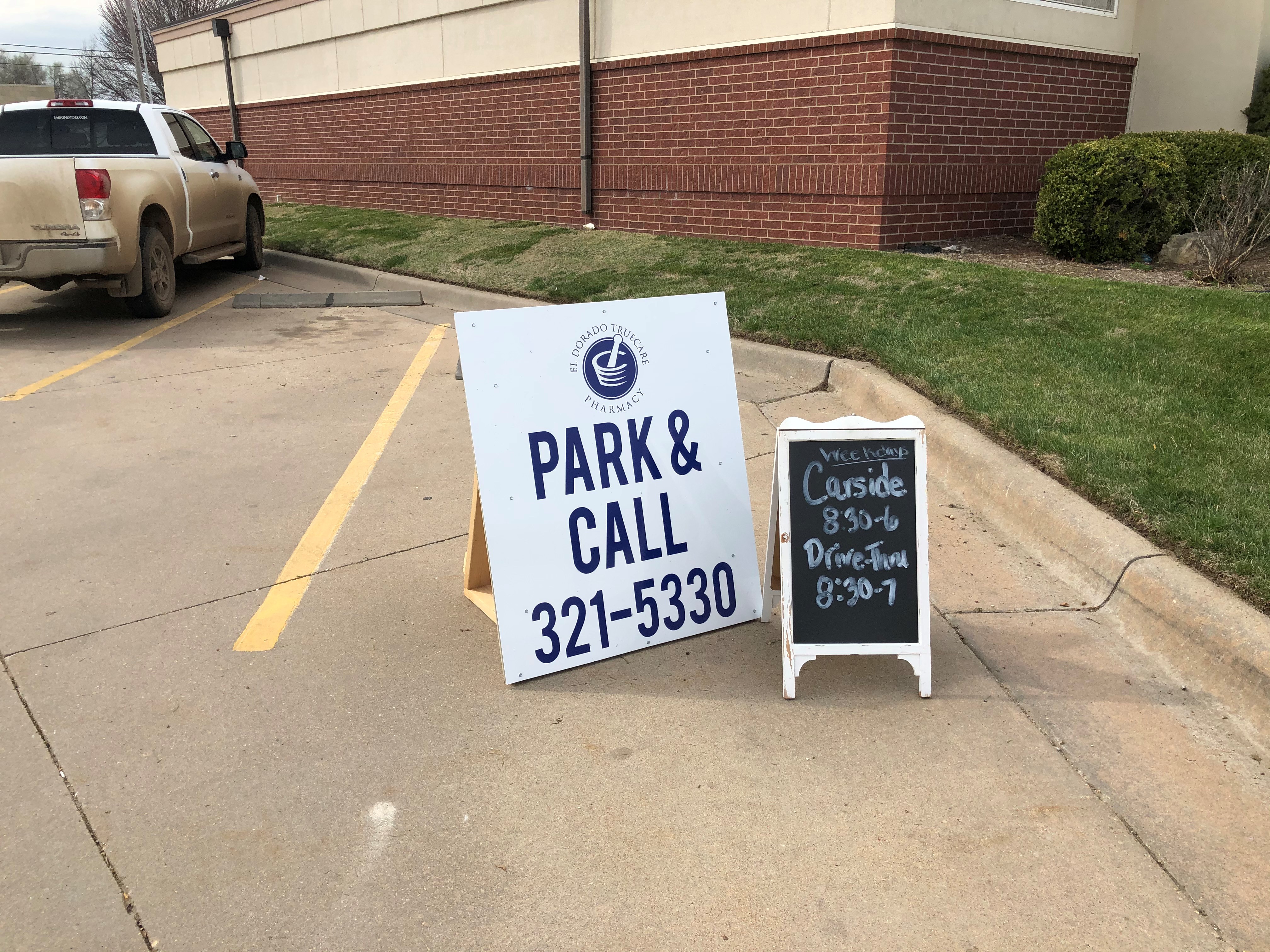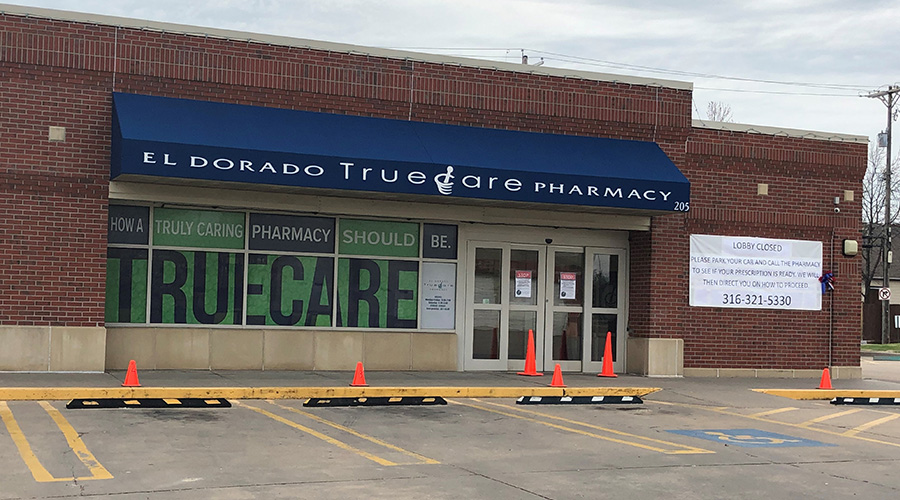As essential healthcare providers, pharmacies are one of the few vital businesses that must remain open during the coronavirus pandemic. People can live without their favorite sushi or the latest Hollywood blockbuster, but they can’t live without their medication. While most restaurants and retailers are closing shop, independent community pharmacies are finding creative ways to serve their patients while prioritizing safety and doing their part to flatten the curve.
Mike Bellesine, owner of TrueCare Pharmacy in El Dorado, Kansas, started gearing up for the pandemic ahead of the curve, planning for various scenarios with his management staff in early March. As soon as schools in the state closed down for the year, Bellesine knew it was time to act. He decided to completely close the doors of the pharmacy and serve patients solely through curbside, drive-thru, and delivery. Bellesine believes the change is essential for long-term viability, but the decision was ultimately about people. “I have always treated my employees and my business as my family,” he said. “I wanted to protect my family, the people I employ, I wanted to protect my customers, and I want to see the end of this crisis.”
In less than two days, he converted his pharmacy into a closed-door business. Parking spots became stalls for curbside pickup, marked with numbered cones. An extra delivery driver was hired. Counseling sessions were now given over the phone. The pharmacy had to get word out fast, which meant informing physicians, initiating a social media push, and hiring a local design firm to create signage.
It was a sudden and dramatic shift, one that came with the risk of losing patients to the national chains and big-box stores who weren’t limiting customers’ options. “I really thought we would see twenty to forty scripts per day transferred out because they would consider it a hassle,” Bellesine said. “That’s not happened at all. We have about three transfers in to one transfer out.”
Overcoming challenges
Although the transition was successful, it came with some logistical kinks the pharmacy had to work through. The first weekend after closing the doors, before the signs had been created, there were 15 cars lined up at the drive-thru, stretching back to a major road and prompting the police to come and direct traffic. Once patients became aware of the curbside option, things started flowing.
Another challenge was social distancing. The workstations were three feet apart. Hand-to-hand exchanges with patients were required for transactions. Employees would often leave to get takeout for lunch. How to implement social distancing in this environment?
Bellesine converted the point-of-sale stations and counseling areas to new workstations, which allowed at least six feet of distance between each. He implemented rigorous protective precautions for every hand-to-hand exchange with patients. Employees started taking turns bringing in lunch so no one would have to go out.
Other transition requirements included hiring an extra driver, dedicating an employee to direct deliveries, training staff on safe curbside service practices, and going to three split shifts and no days off. “Although not ideal, this allowed for social distancing and lowered the stress levels of our employees,” he said.

Staying Safe: TrueCare Pharmacy’s COVID-19 Preventive Measures
Closing the storefront is only one part of the pharmacy’s measures to prevent the spread of the virus. There are still the risks of transactions with customers and within the office where multiple people work in the same space. Bellesine wakes up early every morning to spend two hours poring over the latest coronavirus coverage. Based on the best evidence available, he has devised several practices and procedures at his pharmacy to keep the virus at bay.
Physical barriers
“Nobody is physically touching anything from the outside while they’re at work,” Bellesine said. Curbside and drive-thru employees always wear gloves and masks. Cash immediately goes into a bag which then goes into a bank bag which gets taken to the bank just so. Credit cards are placed into a clear bag, the numbers are input manually, and the card is returned without the employee ever having touched the card. Physical prescriptions get placed in a clear bag, and the pharmacists verify it through the bag. At every step, at least one barrier separates outside objects from employees.
Policies on receiving mail and packages are based on the virus’s length of viability on different types of material. Everything is quarantined for a period of time to ensure the virus perishes before anyone in the pharmacy touches it. Mail goes directly into a bag for 24 hours, and boxes are bagged and moved to the basement for 24 to 72 hours. Package handlers always wear gloves and masks.
Policies and procedures
Staff members follow strict safety precautions before, during, and after coming into work. Upon arrival, they wash their hands, take their temperature, and put on shoes designated for pharmacy use only. Temperatures are taken again midday. Everything from computer keyboards to the Parata system is cleaned with alcohol or bleach cleaners before and after use.
Handwashing is required every hour, prompted by an announcement over the speaker system and a song. “We kind of made it a game,” Bellesine said. “We have one pharmacist who is kind of our mother hen, and every hour on the hour she’ll get on the intercom system to say it’s handwashing time, and she has these little ditties that she plays, and it’s kind of a race to get to the sinks.”
Internal staff can wear casual attire, and lunch is regularly provided so employees don’t have to go out. Employees are encouraged to avoid congregating, to keep six feet distance at all times.
Policies are posted in a list, and employees are trained as significant changes are made. “We try to emphasize what is the most important and then we give a list of everything else,” Bellesine said. “We’re constantly updating them as we get new information.”
Bellesine also gives employees strong recommendations for distancing while they are not at work. He encourages them, for the safety of the pharmacy family, to follow the latest basic recommendations such as eliminating unnecessary travel, group gatherings, play dates, and family grocery shopping. Part of his job is educating and informing his employees of the seriousness and severity of the situation.
Guiding principles
Bellesine isn’t worried about appearing extreme in the measures he’s taking against COVID-19. He updates policies with developing evidence, and he believes it’s the only way to ensure longevity and safety. “If you do social distancing, wash your hands, and keep your hands away from your face, you’re probably 90 percent less likely to get the coronavirus. Other barriers can reduce that by 6 percent. How far can you go? We don’t know what the correct distance to go is. We’re just having to make decisions on an ongoing basis. I hope to be seen as someone who’s gone way over the top three months from now. My fear is that I won’t be.”
As chain pharmacies continue to lack proper precautions, Bellesine believes he’ll be the last pharmacy standing in El Dorado during this coronavirus pandemic, and he hopes the same for other independents. He would like to see independents sharing ideas, learning from one another, and leading the way as healthcare providers. “This is just a great lesson on how we adapt to our environments. One of the ways is by listening to other people,” he said. “Not everybody has the same setup, but they can start thinking outside the box, because right now we have to.”
An Independently Owned Organization Serving Independent Pharmacies
PBA Health is dedicated to helping independent pharmacies reach their full potential on the buy side of their business. The company is a member-owned organization that serves independent pharmacies with group purchasing services, expert contract negotiations, proprietary purchasing tools, distribution services, and more.
PBA Health, an HDA member, operates its own VAWD-certified warehouse with more than 6,000 SKUs, including brands, generics, narcotics CII-CV, cold-storage products, and over-the-counter (OTC) products.
Want more pharmacy business tips and advice? Sign up for our e-newsletter. COVID-19












